Tag Archives: Teacher
Posted on February 17, 2016 by Sophie Hicks
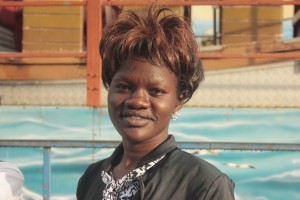
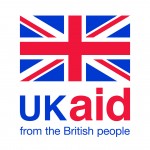
Irene started her early career as a tap dancer. Trained for a year by a man from California named Jack, she still has a real passion for the dance with ‘the glass shoes’. Now an Early Childhood Development teacher in Anaka P7 Primary School in Nwoya district, Northern Uganda, she regularly brings song and dance into her lessons as a way of energising her pupils and bringing her classroom alive. This interactive style of teaching is just one of the things she has learned from participating in Teacher Changemaker network, implemented by STIR Education and coordinated in Nwoya district by African Revival.
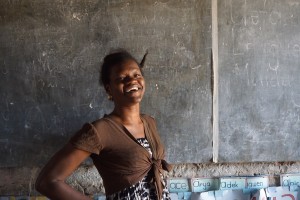 The Teacher Changemaker network encourages teachers across Uganda to introduce ‘micro innovations’, new techniques to increase the quality of education, into their lessons to respond to the challenges they face in the Ugandan education system. For Irene and her colleagues at Anaka P7, one of the main challenges is lack of parental engagement: “We decided that parental engagement is the biggest problem affecting our school. There are parents that, when you call them for a meeting, they don’t want to come. They don’t provide the scholastic materials for their children. You find a child will come to school hungry, without having eaten, and not be able to concentrate in class. Children like this end up failing.” She and her fellow teachers have introduced a procedure to counteract this challenge: “The first step is to call the parents for a meeting. The second stage is to go up to the home to see what is the problem stopping this child from performing. And the time comes when the parents start to listen, slowly, until they are now following the advice of the teacher. We have used this procedure and now there are many who come to check the progress of the children”. This micro innovation is already having positive results. This year, more children in Irene’s class passed, and she has noticed a change in the attitude of her students in class, now their parents are taking more of an interest in their education.
The Teacher Changemaker network encourages teachers across Uganda to introduce ‘micro innovations’, new techniques to increase the quality of education, into their lessons to respond to the challenges they face in the Ugandan education system. For Irene and her colleagues at Anaka P7, one of the main challenges is lack of parental engagement: “We decided that parental engagement is the biggest problem affecting our school. There are parents that, when you call them for a meeting, they don’t want to come. They don’t provide the scholastic materials for their children. You find a child will come to school hungry, without having eaten, and not be able to concentrate in class. Children like this end up failing.” She and her fellow teachers have introduced a procedure to counteract this challenge: “The first step is to call the parents for a meeting. The second stage is to go up to the home to see what is the problem stopping this child from performing. And the time comes when the parents start to listen, slowly, until they are now following the advice of the teacher. We have used this procedure and now there are many who come to check the progress of the children”. This micro innovation is already having positive results. This year, more children in Irene’s class passed, and she has noticed a change in the attitude of her students in class, now their parents are taking more of an interest in their education.
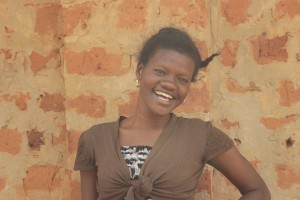 Irene is confident that the innovations and increased focus on critical analysis and problem solving that the Changemaker network has facilitated will continue to have a positive impact on her primary school: “as long as we keep innovations coming to Anaka p7, there will be a great many positive changes. Though we have some parents who don’t listen to the school, in time there will be a lot of improvements because us teachers have learned ways of solving the problems we face”
Irene is confident that the innovations and increased focus on critical analysis and problem solving that the Changemaker network has facilitated will continue to have a positive impact on her primary school: “as long as we keep innovations coming to Anaka p7, there will be a great many positive changes. Though we have some parents who don’t listen to the school, in time there will be a lot of improvements because us teachers have learned ways of solving the problems we face”
The network is also having a positive impact on Irene’s confidence and motivation as a teacher: “The network taught me that, if you are a teacher, you should have confidence in everything you do, you should be exemplary, you should have knowledge, you should be someone who searches for things that will make a change. Someone creative in the mind who will search for ways to make the children learn well and pass”.
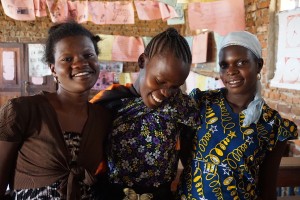 She also enjoys the unity and collaboration with the other Teacher Changemakers, which is a real advantage for all participants. Teaching in any part of the world can be a difficult job, and in Uganda the lack of good infrastructure, teaching materials and training exacerbates the already considerable challenges. By encouraging teachers to share and support each other, the Teacher Changemaker network is looking to alleviate these challenges through an informal support system that allows participants to vocalise their problems and search for solutions together. This style of network also means that innovations produced by the teachers are tailored to the specific localised environments across Uganda, rather than ready-made solutions designed out of context. This contributes to the success of the network and its popularity amongst its Changemakers, especially Irene, who advised teachers to try out the new Changemaker innovations for themselves: “My advice for other teachers is this: go and put the micro innovations into use, because they will help a lot. And help you learn how to communicate with others, discuss, be social and cooperative and many others. When you go back to school tell others to do the same!”
She also enjoys the unity and collaboration with the other Teacher Changemakers, which is a real advantage for all participants. Teaching in any part of the world can be a difficult job, and in Uganda the lack of good infrastructure, teaching materials and training exacerbates the already considerable challenges. By encouraging teachers to share and support each other, the Teacher Changemaker network is looking to alleviate these challenges through an informal support system that allows participants to vocalise their problems and search for solutions together. This style of network also means that innovations produced by the teachers are tailored to the specific localised environments across Uganda, rather than ready-made solutions designed out of context. This contributes to the success of the network and its popularity amongst its Changemakers, especially Irene, who advised teachers to try out the new Changemaker innovations for themselves: “My advice for other teachers is this: go and put the micro innovations into use, because they will help a lot. And help you learn how to communicate with others, discuss, be social and cooperative and many others. When you go back to school tell others to do the same!”
Posted in News |
Tagged Acholi, African Revival, Changemaker, Development, ECD, Education, inspiration, International Development, Jumpstart!, Kampala, Kilimanjaro, Nursery, Nursery School, Profile, Pupils, School, School Development, STIREducation, Teacher, Teacher training, Uganda |
Leave a comment
Posted on February 11, 2016 by Sophie Hicks
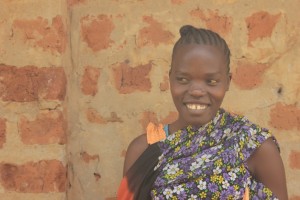 Kevin, aged 23, is a primary teacher from Anaka P7 Primary School, and a fantastic Teacher Changemaker! She is participating in STIR Education’s Teacher Changemaker network, which is designed for teachers to share ideas and innovations, as well as to provide a source of motivation for educators in what can be a difficult working environment. African Revival’s Jumpstart! team has been helping STIR to manage the network in Nwoya district, where we caught up with Kevin to find out how the Changemaker network is benefitting her and her students!
Kevin, aged 23, is a primary teacher from Anaka P7 Primary School, and a fantastic Teacher Changemaker! She is participating in STIR Education’s Teacher Changemaker network, which is designed for teachers to share ideas and innovations, as well as to provide a source of motivation for educators in what can be a difficult working environment. African Revival’s Jumpstart! team has been helping STIR to manage the network in Nwoya district, where we caught up with Kevin to find out how the Changemaker network is benefitting her and her students!
I teach in the primary section of Anaka P7. I like the lower primary classes because they are young and friendly, so I enjoy interacting with them. The Teacher Changemaker network has given me a lot of methods about how to handle children, especially children with behavioural problems. It has given me more skills to handle the stubborn ones, the latecomers, and others with different problems.
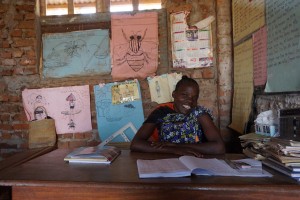 The best thing about being part of the Teacher Changemaker network is that we meet many Changemakers who give us many new skills. I have learnt the qualities of a good teacher, how to handle the classroom situation and how to make the classroom into a good learning environment.
The best thing about being part of the Teacher Changemaker network is that we meet many Changemakers who give us many new skills. I have learnt the qualities of a good teacher, how to handle the classroom situation and how to make the classroom into a good learning environment.
Being a Changemaker means being a teacher who is an all rounder, being a teacher who has a growth mind-set not a fixed mind-set and a teacher who is always ready for anything. As a Changemaker, you have to practice what you preach. You have to be innovative, influential, creative and motivate the learners.
This year I will use one micro innovation that I call ‘I do, we do, you do’. I will first do on my own as the learners watch and learn from me. Then ‘we do’ together. Then ‘you do’ – one particular learner will do as I observe and correct the work. We had some training about this. I’ve tried it before and it always works very well. Even during our teacher training, we do the exercises like this and it’s a nice technique.
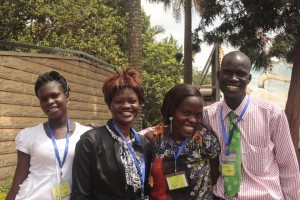 Since being involved in the Teacher Changemaker network, I have one success story about a child who didn’t enjoy learning. The child came from a long distance away, so the problem was lack of lunch, because at school we don’t provide food for the learners. I decided to talk to the parents of the child to make a plan. I started by advising them that in life there is mostly one thing: if the stomach is full, the brain will be open to learning new things, but if the stomach is complaining, the brain is focused on the stomach. The parents followed my advice and sent the child to school with packed lunch. Soon after, the learning behaviour of the child changed – they came to school early and concentrated in class. When the year ended last year, the child passed very well. After I saw the positive progress of the child, I told my fellow Changemakers in my school about the procedure I had used.
Since being involved in the Teacher Changemaker network, I have one success story about a child who didn’t enjoy learning. The child came from a long distance away, so the problem was lack of lunch, because at school we don’t provide food for the learners. I decided to talk to the parents of the child to make a plan. I started by advising them that in life there is mostly one thing: if the stomach is full, the brain will be open to learning new things, but if the stomach is complaining, the brain is focused on the stomach. The parents followed my advice and sent the child to school with packed lunch. Soon after, the learning behaviour of the child changed – they came to school early and concentrated in class. When the year ended last year, the child passed very well. After I saw the positive progress of the child, I told my fellow Changemakers in my school about the procedure I had used.
The happiest moment I have ever had is when I graduated from teaching college. I found that during my school practice I got an A! I celebrated this moment, because it’s the moment I became a qualified teacher.
I want to go to the next level of education. I want to do a degree in primary education. If I can, I’ll try East African International University in Kampala where this year’s STIR Education summit was held. I will work very hard to achieve this goal.
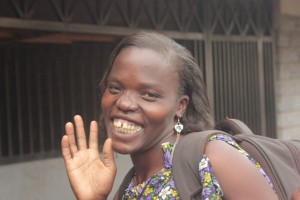 My role model is my dad because he is a teacher, so I’ve also decided to take his profession. He is a head teacher in St.Luke’s Primary School in Nwoya district. I always look at what he does and admire him because he is funny, friendly and nice.
My role model is my dad because he is a teacher, so I’ve also decided to take his profession. He is a head teacher in St.Luke’s Primary School in Nwoya district. I always look at what he does and admire him because he is funny, friendly and nice.
If I could give one piece of advice to a group of people it would be to be comfortable with change. They should not be static. If change comes, they should be open to new things. Like if a new teaching innovation is introduced we should embrace it.
Posted in News |
Tagged African Revival, Changemaker, Development, ECD, Education, Gulu, inspiration, International Development, Jumpstart!, Kampala, Nursery School, School Development, STIREducation, Teacher, Teacher training, Uganda |
Leave a comment
Posted on September 9, 2015 by Sophie Hicks
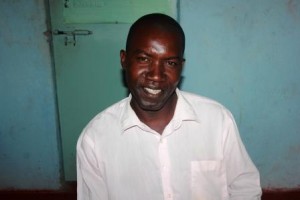 Here at African Revival, we absolutely love meeting brilliant and inspiring teachers! Mondella, from Inkumbi Basic School, is one such teacher.
Here at African Revival, we absolutely love meeting brilliant and inspiring teachers! Mondella, from Inkumbi Basic School, is one such teacher.
Mondella is originally from Mongo, a town in Zambia’s western province, but moved to Livingstone (southern province) in 1997 to study for his teaching certificate at Livingstone College of Education. Mondella has now been a teacher for fifteen years, and joined the teaching staff at Inkumbi Basic three years ago. Mondella lives on the school compound with his wife and children who attend the school. He has an 11-year old son, Naromindilla and twin daughters: Sepiso and Seveso who are six. Naromindilla is in grade 7, whilst the twins are currently in grade 1 and are taught by their mother, Natala, who is also a teacher. When your mother is your teacher, we’re sure that the old “the dog ate my home-work” excuses don’t really fly!
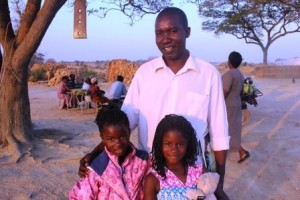
Mondella currently teaches grade 6, and also teaches maths and science to students in the upper basic section (secondary) of the school. Mondella actually entered the teaching profession because he was so inspired by one of his own secondary school teachers: “I used to really admire my physics, chemistry and biology teacher; he was my role model, he taught me so many things and he was just a genius because he had so much knowledge! He encouraged me a lot, and I wanted to be like him.” Just like his own teacher, Mondella likes “seeing children learn things they never knew before, and seeing them develop as individuals and as peers, it really brings joy to me”. One of the reasons Mondella loves seeing his students eager to learn is because he knows just how valuable education is, and what it can help people achieve: “(education) is so important, and the good thing is that it doesn’t choose who you are- whether you are rich or poor, as long as you can study, you can improve your life and move forward. You could be poor but if you have an education, then you can work your way up- a farmer’s son could even become president!”
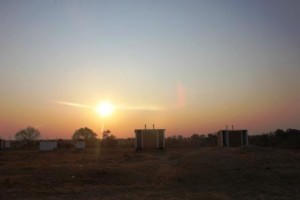 However, it can be challenging to give the children at Inkumbi the quality of teaching they deserve as the school struggles with over-enrolment and under-staffing. Although Mondella tells us that he tries his best, managing large classes is hard, and ideally he would like to divide the classes up, so that he can give individual children more attention. Although the school has its difficulties, the pupils still enjoy and benefit from their learning environment: “My pupils enjoy learning; they like school because they are learning new things, and they are able to socialise with their peers. They have time to play so they like it here.” Mondella hopes that his pupils will continue to enjoy school so that “they will complete their education, and they might be employed or self-reliant due to the knowledge which they have acquired here at school.”
However, it can be challenging to give the children at Inkumbi the quality of teaching they deserve as the school struggles with over-enrolment and under-staffing. Although Mondella tells us that he tries his best, managing large classes is hard, and ideally he would like to divide the classes up, so that he can give individual children more attention. Although the school has its difficulties, the pupils still enjoy and benefit from their learning environment: “My pupils enjoy learning; they like school because they are learning new things, and they are able to socialise with their peers. They have time to play so they like it here.” Mondella hopes that his pupils will continue to enjoy school so that “they will complete their education, and they might be employed or self-reliant due to the knowledge which they have acquired here at school.”
We think Mondella’s pupils are very fortunate to have such a passionate teacher, who works so hard to instil a love for knowledge in his students. We’re sure that, just as his teacher inspired him, Mondella has inspired many children over the years to pursue excellent vocations!
Posted in News |
Tagged Africa, International Development, Teacher, Teacher training, Zambia |
Leave a comment
 The Teacher Changemaker network encourages teachers across Uganda to introduce ‘micro innovations’, new techniques to increase the quality of education, into their lessons to respond to the challenges they face in the Ugandan education system. For Irene and her colleagues at Anaka P7, one of the main challenges is lack of parental engagement: “We decided that parental engagement is the biggest problem affecting our school. There are parents that, when you call them for a meeting, they don’t want to come. They don’t provide the scholastic materials for their children. You find a child will come to school hungry, without having eaten, and not be able to concentrate in class. Children like this end up failing.” She and her fellow teachers have introduced a procedure to counteract this challenge: “The first step is to call the parents for a meeting. The second stage is to go up to the home to see what is the problem stopping this child from performing. And the time comes when the parents start to listen, slowly, until they are now following the advice of the teacher. We have used this procedure and now there are many who come to check the progress of the children”. This micro innovation is already having positive results. This year, more children in Irene’s class passed, and she has noticed a change in the attitude of her students in class, now their parents are taking more of an interest in their education.
The Teacher Changemaker network encourages teachers across Uganda to introduce ‘micro innovations’, new techniques to increase the quality of education, into their lessons to respond to the challenges they face in the Ugandan education system. For Irene and her colleagues at Anaka P7, one of the main challenges is lack of parental engagement: “We decided that parental engagement is the biggest problem affecting our school. There are parents that, when you call them for a meeting, they don’t want to come. They don’t provide the scholastic materials for their children. You find a child will come to school hungry, without having eaten, and not be able to concentrate in class. Children like this end up failing.” She and her fellow teachers have introduced a procedure to counteract this challenge: “The first step is to call the parents for a meeting. The second stage is to go up to the home to see what is the problem stopping this child from performing. And the time comes when the parents start to listen, slowly, until they are now following the advice of the teacher. We have used this procedure and now there are many who come to check the progress of the children”. This micro innovation is already having positive results. This year, more children in Irene’s class passed, and she has noticed a change in the attitude of her students in class, now their parents are taking more of an interest in their education. Irene is confident that the innovations and increased focus on critical analysis and problem solving that the Changemaker network has facilitated will continue to have a positive impact on her primary school: “as long as we keep innovations coming to Anaka p7, there will be a great many positive changes. Though we have some parents who don’t listen to the school, in time there will be a lot of improvements because us teachers have learned ways of solving the problems we face”
Irene is confident that the innovations and increased focus on critical analysis and problem solving that the Changemaker network has facilitated will continue to have a positive impact on her primary school: “as long as we keep innovations coming to Anaka p7, there will be a great many positive changes. Though we have some parents who don’t listen to the school, in time there will be a lot of improvements because us teachers have learned ways of solving the problems we face” She also enjoys the unity and collaboration with the other Teacher Changemakers, which is a real advantage for all participants. Teaching in any part of the world can be a difficult job, and in Uganda the lack of good infrastructure, teaching materials and training exacerbates the already considerable challenges. By encouraging teachers to share and support each other, the Teacher Changemaker network is looking to alleviate these challenges through an informal support system that allows participants to vocalise their problems and search for solutions together. This style of network also means that innovations produced by the teachers are tailored to the specific localised environments across Uganda, rather than ready-made solutions designed out of context. This contributes to the success of the network and its popularity amongst its Changemakers, especially Irene, who advised teachers to try out the new Changemaker innovations for themselves: “My advice for other teachers is this: go and put the micro innovations into use, because they will help a lot. And help you learn how to communicate with others, discuss, be social and cooperative and many others. When you go back to school tell others to do the same!”
She also enjoys the unity and collaboration with the other Teacher Changemakers, which is a real advantage for all participants. Teaching in any part of the world can be a difficult job, and in Uganda the lack of good infrastructure, teaching materials and training exacerbates the already considerable challenges. By encouraging teachers to share and support each other, the Teacher Changemaker network is looking to alleviate these challenges through an informal support system that allows participants to vocalise their problems and search for solutions together. This style of network also means that innovations produced by the teachers are tailored to the specific localised environments across Uganda, rather than ready-made solutions designed out of context. This contributes to the success of the network and its popularity amongst its Changemakers, especially Irene, who advised teachers to try out the new Changemaker innovations for themselves: “My advice for other teachers is this: go and put the micro innovations into use, because they will help a lot. And help you learn how to communicate with others, discuss, be social and cooperative and many others. When you go back to school tell others to do the same!”








